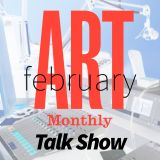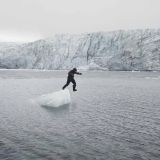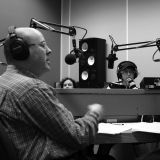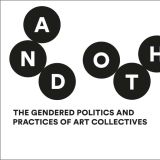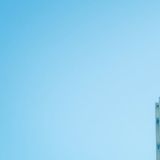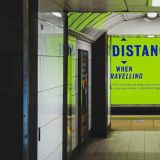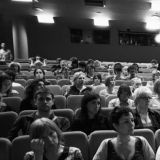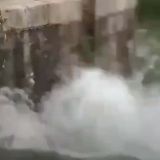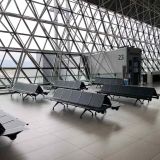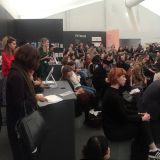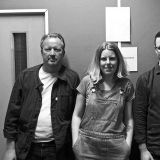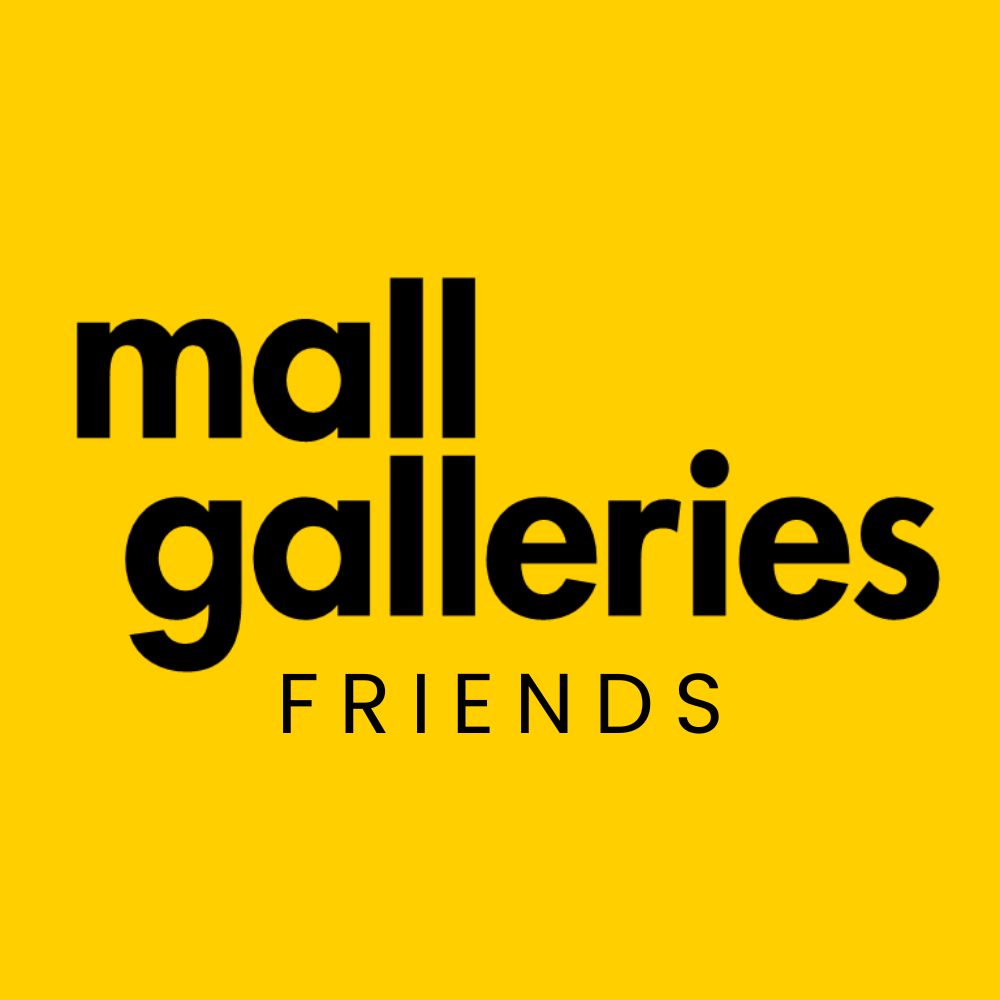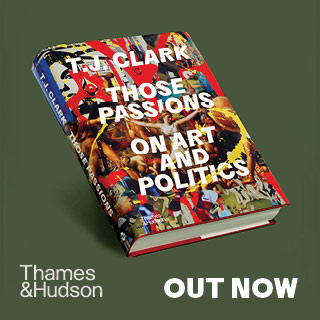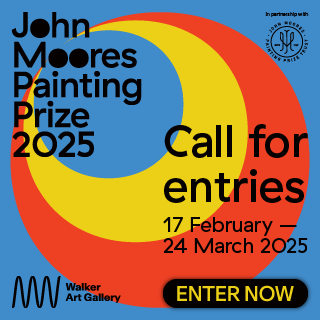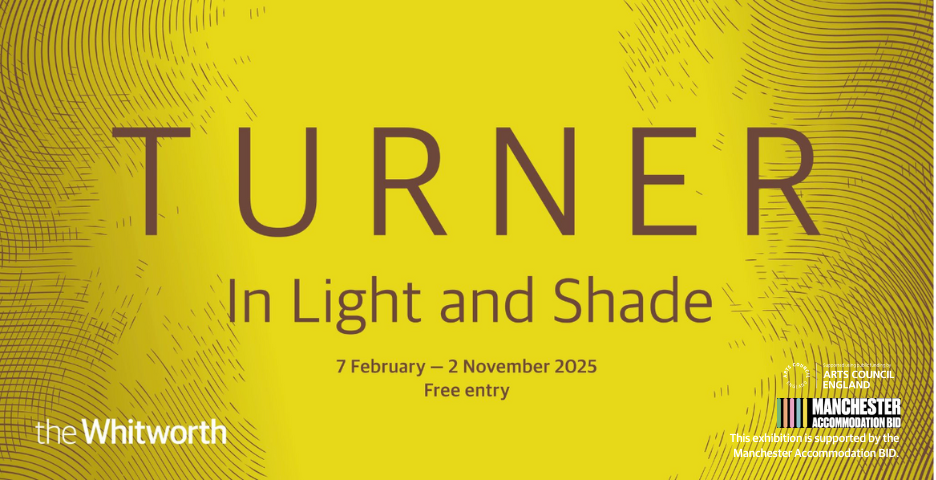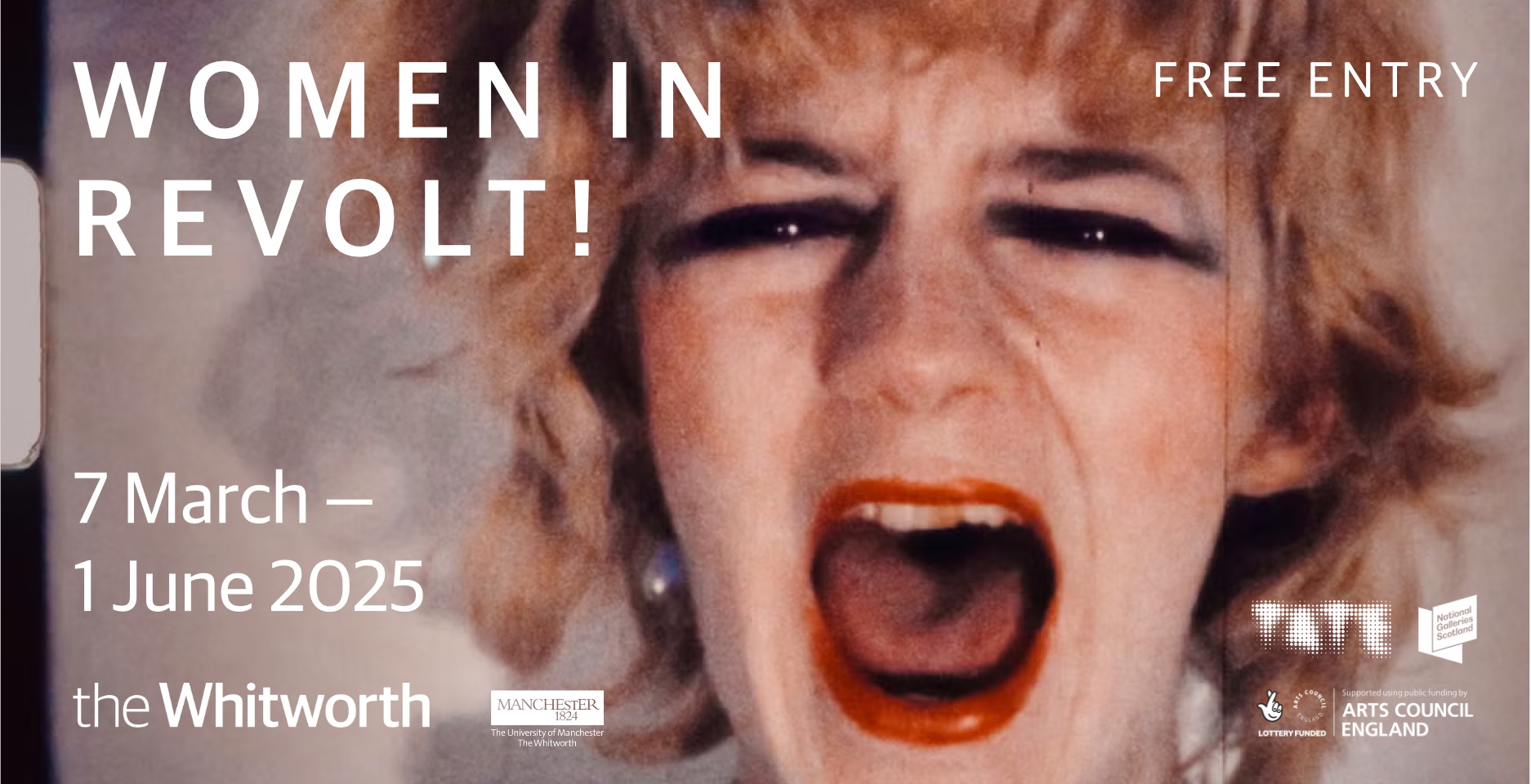Art Monthly Events
10-Feb-25
Talk Show on Resonance FM
Erika Balsom, Ben Burbridge & Dan Kidner
Hosted by Chris McCormack
Erika Balsom on John Smith’s latest film ‘Being John Smith’, Ben Burbridge on rave culture as an unfulfilled promise for a new politics of the left and Dan Kidner reviews the Deep Time festival at Fruitmarket in Edinburgh.
Permalink9-Dec-24
Talk Show on Resonance FM
Mark Prince
Hosted by Matt Hale
Mark Prince discusses postwar US modernist abstraction as a form of cultural protectionism.
Permalink26-Nov-24
Future Climates
Future Climates Symposium Day 2
Josephine Berry and Jonas Staal
John Kenneth Paranada and Robert Zhao Renhui
Future Climates is a symposium that brings together an international array of artists, writers and curators who directly respond to the climate emergency. The talks attempt to move beyond established forms of activism and ask how artists and cultural practitioners might envision alternative pathways, propose new models and make real-world differences. By focusing on the unique position artists play, these talks aim to test and probe the question of how that change might be manifested.
Over the duration of the series speakers include: Lise Autogena, Fiona Banner, Ajay Singh Chaudary, Maja and Reuben Fowkes, Jay Jordan, Amal Khalaf, Maggie Murray, Alona Pardo, John Kenneth Pranada, Filipa Ramos, Oliver Ressler, Jonas Staal, Robert Zaho Renhui.
Talks devised by Art Monthly’s Chris McCormack and Newcastle University’s Uta Kögelsberger.
26 November 2024
PANEL 1
15.00 Introduction
15.10 Josephine Berry
15.30 Jonas Staal
15.50 In conversation 1 (chair Chris McCormack)
PANEL 2
16.50 Introduction
17.00 Robert Zhao Renhui
17.20 John Kenneth Paranda
17.40 In conversation 2 (chair Olga Smith)
Free event, open to the public
Fine Art Lecture Theatre, Newcastle University
29-Oct-24
Future Climates
Future Climates Symposium Day 1
Maggie Murray and Alona Pardo
Jay Jordan and Ajay Singh Chaudhary
Fiona Banner and Filipa Ramos
Future Climates is a symposium that brings together an international array of artists, writers and curators who directly respond to the climate emergency. The talks attempt to move beyond established forms of activism and ask how artists and cultural practitioners might envision alternative pathways, propose new models and make real-world differences. By focusing on the unique position artists play, these talks aim to test and probe the question of how that change might be manifested.
Over the duration of the series speakers include: Lise Autogena, Fiona Banner, Ajay Singh Chaudary, Maja and Reuben Fowkes, Jay Jordan, Amal Khalaf, Maggie Murray, Alona Pardo, John Kenneth Pranada, Filipa Ramos, Oliver Ressler, Jonas Staal, Robert Zaho Renhui.
Talks devised by Art Monthly’s Chris McCormack and Newcastle University’s Uta Kögelsberger.
29 October 2024
PANEL 1
14.00 Introduction (Chris McCormack and Uta Kögelsberger)
14.20 Alona Pardo
14.40 Maggie Murray
15.00 In conversation 1 (chair Fiona Anderson/Chris McCormack)
PANEL 2
15.45 Introduction
15.50 Ajay Singh Chaudary
16.10 Jonas Staal
16.30 In conversation 2 (chair Harry Weeks)
PANEL 3
17.30 Introduction
17.35 Fiona Banner
17.55 Filipa Ramos
18.15 Jay Jordan
18.25 In conversation 3 (chair Jo Coupe)
19.00 Drinks
20.00 Dinner
Free event, open to the public
Fine Art Lecture Theatre, Newcastle University
14-Oct-24
Talk Show on Resonance FM
Bob Dickinson & Tom Denman
Hosted by Matt Hale
Bob Dickinson discusses artists who connect the sleep crisis to the climate crisis, while Tom Denman reviews the ‘Towards New Worlds’ exhibition at MIMA in Middlesbrough.
Permalink9-Sep-24
Talk Show on Resonance FM
Michael Kurtz, Lauren Velvick & Sarah E James
Hosted by Chris McCormack
Michael Kurtz discusses the work of Delcy Morelos; Lauren Velvick on Roy Claire Potter’s ‘The Wastes’; Sarah E James considers exhibition formats that offer more complex models than those put forward in Claire Bishop’s book ‘Disordered Attention’.
Permalink8-Jul-24
Talk Show on Resonance FM
Vaishna Surjid, Amna Malik & Henry Broome
Hosted by Chris McCormack
Vaishna Surjid discusses Soumya Sankar Bose’s exhibition ‘Braiding Dusk and Dawn’ at Deflina Foundation in London; Amna Malik reviews Permindar Kaur’s exhibition ‘Nothing is Fixed’ at John Hansard Gallery in Southampton; and Henry Broome reports on public art in relation to homelessness and sanitation.
Permalink10-Jun-24
Talk Show on Resonance FM
Mark Prince
Hosted by Matt Hale
Mark Prince argues that digitalisation adds another dimension to debates about intention and production in a discussion that covers photography, painting and sculpture and covers artists ranging from Marcel Duchamp and Robert Ryman to Jon Rafman.
Permalink13-May-24
Talk Show on Resonance FM
Tom Hastings, Sam Keogh & Luisa Lorenzo Corna
Hosted by Chris McCormack
Tom Hastings, Sam Keogh and Luisa Lorenzo Corna discuss the attempts to suppress political protest and artists’ voices in the light of the current war in Gaza.
Permalink30-Apr-24
Future Climates
Lise Autogena, Maja & Reuben Fowkes
Lise Autogena, artist and academic, and Maja & Reuben Fowkes, art historians and curators, discuss how their practices have responded to the climate emergency. Chaired by Chris McCormack, associate editor at Art Monthly.
‘Future Climates: Artists and Curators respond to the Climate Crisis’ is a new series of talks developed in collaboration between Art Monthly and the School of Arts and Cultures, Newcastle University. The series brings together international artists, curators, writers to reflect on how cultural practices can respond to the climate crisis and its complex, societal, political, economic, historical entanglements with a specific focus on practices and thinking that go beyond aesthetic and conceptual engagement and set about making a real-life difference.
Talks devised by Art Monthly’s Chris McCormack and Newcastle University’s Uta Kögelsberger.
Free event, open to the public
Fine Art Lecture Theatre, Newcastle University
8-Apr-24
Talk Show on Resonance FM
Bob Dickinson
Hosted by Matt Hale
Bob Dickinson surveys the rise of authoritarian rule and charts feminist art practices that resist such forces.
Permalink12-Mar-24
Future Climates
Amal Khalaf & Oliver Ressler
Amal Khalaf, curator and artist, and Oliver Ressler, artist and filmmaker, discuss how their practices have responded to the climate emergency. Chaired by Neil Bromwich, senior lecturer at Newcastle University and part of the artist duo Walker & Bromwich.
‘Future Climates: Artists and Curators respond to the Climate Crisis’ is a new series of talks developed in collaboration between Art Monthly and the School of Arts and Cultures, Newcastle University. The series brings together international artists, curators, writers to reflect on how cultural practices can respond to the climate crisis and its complex, societal, political, economic, historical entanglements with a specific focus on practices and thinking that go beyond aesthetic and conceptual engagement and set about making a real-life difference.
Talks devised by Art Monthly’s Chris McCormack and Newcastle University’s Uta Kögelsberger.
Free event, open to the public
Fine Art Lecture Theatre, Newcastle University
11-Mar-24
Talk Show on Resonance FM
Laura Harris & Morgan Quaintance
Presented by Matt Hale
Laura Harris claims that the Levelling Up programme is a sham and Morgan Quaintance argues that Chris Ofili’s ‘Requiem’ for the victims of Grenfell Tower was compromised from the start.
Permalink12-Feb-24
Talk Show on Resonance FM
Sarah E James, Jumana Manna & Larissa Sansour
Presented by Chris McCormack
Sarah E James discusses her article on cultural censorship and exclusion of Palestinian and pro-Palestinian voices in the arts and beyond, with the artists Jumana Manna and Larissa Sansour.
Permalink11-Dec-23
Talk Show on Resonance FM
Michael Hampton
Presented by Matt Hale
13-Nov-23
Talk Show on Resonance FM
Anna Dezeuze & Maria Walsh
Presented by Matt Hale
Anna Dezeuze discusses whether it is possible for art to turn the tide on ‘alt-right’ conspiracy theories, and Maria Walsh explores the work of Lebanese artist filmmaker Ali Cherri.
Permalink9-Oct-23
Talk Show on Resonance FM
Matthew Bowman & Bob Dickinson
Presented by Matt Hale
Matthew Bowman goes in search of lost experience in the commercially co-opted field of immersive art and Bob Dickinson argues that citizen artists can intervene to halt the seemingly inexorable process of gentrification.
Permalink11-Sep-23
Talk Show on Resonance FM
Sophie J Williamson & Bob Dickinson
Presented by Matt Hale
Sophie J Williamson assesses the turn towards art-food practices, particularly fermentation, and how these can be politicised to counter societal decay, and Bob Dickinson argues that it is time to repair the damage done by rampant individualism, the hallmark of both modernist and neoliberal cultures, which has undermined social cohesion in art and society.
Permalink10-Jul-23
Talk Show on Resonance FM
Susan Jones & Stephanie Bailey
Presented by Chris McCormack
Susan Jones analyses the way funding models continue to exploit artists’ labour and Stephanie Bailey discusses the work of Beijing-based artist Wang Tuo. Presented by Chris McCormack.
Permalink12-Jun-23
Talk Show on Resonance FM
Colin Perry
Presented by Matt Hale
Colin Perry discusses the earth work of contemporary artists and its differences from Land Art of the past or eco art of the present.
Permalink8-May-23
Talk Show on Resonance FM
Larne Abse Gogarty & Rebecca Jarman
Presented by Chris McCormack
Larne Abse Gogarty critiques the return of figurative painting and Rebecca Jarman reports on the São Paulo art scene.
Permalink10-Apr-23
Talk Show on Resonance FM
Greg Thomas & Sophie J Williamson
Presented by Matt Hale
Greg Thomas reports on the artists’ huts of Scotland’s Bothy Project and Sophie J Williamson discusses artists who target the excesses of extractive capitalism.
Permalink13-Mar-23
Talk Show on Resonance FM
Morgan Quaintance
Presented by Matt Hale
Morgan Quaintance discusses the dichotomy between the art world’s competitive pitching of artists against each other and its proclamations of nurturing care.
Permalink13-Feb-23
Talk Show on Resonance FM
Martin Holman & Mimi Howard
Presented by Matt Hale
Martin Holman reports on a major Arte Povera survey exhibition in Paris and Mimi Howard discusses the issues around gallery presentation of video art in the age of the smartphone.
Permalink12-Dec-22
Talk Show on Resonance FM
Chris Fite-Wassilak & Chris Hayes
Presented by Mark William Lewis
Chris Fite-Wassilak on artists who make use of fungus as a pointed form of institutional critique; Chris Hayes argues that we need to re-engage with anticapitalist thinking about technology.
Permalink1-Dec-22
Roadshow
And Others 4: ‘The Third Hand’ – Claire, Bernadette and Friends
In collaboration with Birmac
And Others: The Gendered Politics and Practices of Art Collectives
BIRMAC and Art Monthly, in association with Electra, present a series of four online panel conversations investigating different questions central to collective work. Building on two months of asynchronous collective writing, involving seventeen participants, the panelists below consider how we might write, think, read and practice together through other means.
Convened and moderated by Lina Dzuverovic, Birkbeck, University of London
4: ‘The Third Hand’ – Claire, Bernadette and Friends
Helena Reckitt, Chris McCormack, Gerrie van Noord
Considering the deliberate erasure of individual identities, this panel combines two interwoven lines of enquiry. Firstly, it considers a particular approach to working collectively, one in which the identities of each individual artist involved are deliberately obfuscated, forming a singular, newly created artist with their own name and a distinct, manufactured identity – what Charles Green terms the ‘third hand’.
Online event – free, but booking essential.
Permalink18-Nov-22
Roadshow
And Others 3: Is Ephemerality Freedom?
In collaboration with Birmac
And Others: The Gendered Politics and Practices of Art Collectives
BIRMAC and Art Monthly, in association with Electra, present a series of four online panel conversations investigating different questions central to collective work. Building on two months of asynchronous collective writing, involving seventeen participants, the panelists below consider how we might write, think, read and practice together through other means.
Convened and moderated by Lina Dzuverovic, Birkbeck, University of London
3: Is Ephemerality Freedom?
Ximena Alarcón-Díaz, Kuda.org/Zoran Pantelic, Irene Revell, Marina Rosenfeld
This panel questions the relationship between medium and process, taking in improvised and experimental sound practices to ask questions about different attitudes to and experiences of collective work, and whether a certain openness and enthusiasm towards collaboration, and an excitement about the process itself predominates within music and sound practice, as compared to the visual arts.
Online event – free, but booking essential.
Permalink14-Nov-22
Talk Show on Resonance FM
Emily Rosamond, Juliet Jacques & Lucia Farinati
Presented by Chris McCormack
Emily Rosamond discusses online reputation warfare, Juliet Jacques reports on Manifesta 14 in Prishtina and Lucia Farinati reviews a show by Italian feminist artist group Le Nemesiache.
Permalink10-Nov-22
Roadshow
And Others 2: Why collaborate? Network Formation, Reproduction, Access
In collaboration with Birmac
And Others: The Gendered Politics and Practices of Art Collectives
BIRMAC and Art Monthly, in association with Electra, present a series of four online panel conversations investigating different questions central to collective work. Building on two months of asynchronous collective writing, involving seventeen participants, the panelists below consider how we might write, think, read and practice together through other means.
Convened and moderated by Lina Dzuverovic, Birkbeck, University of London
2: Why collaborate? Network Formation, Reproduction, Access
Carla Cruz, Lily Hall, Abhijan Toto, Felicity Allen, Manual Labours
Focusing on the possible divergences between external articulations of collectivity and their internal working realities, this panel explores the formation and reproduction of networks, asking how cultural organisations engage with collective work, exploring the blurry lines and unstable positions between organisational (curatorial, communication, production, administrative) and artistic work, and the gaps between naming and acting.
Online event – free, but booking essential.
Permalink31-Oct-22
Roadshow
And Others 1: Labour, Value and Social Reproduction
In collaboration with Birmac
And Others: The Gendered Politics and Practices of Art Collectives
BIRMAC and Art Monthly, in association with Electra, present a series of four online panel conversations investigating different questions central to collective work. Building on two months of asynchronous collective writing, involving seventeen participants, the panelists below consider how we might write, think, read and practice together through other means.
Convened and moderated by Lina Dzuverovic, Birkbeck, University of London
1: Labour, Value and Social Reproduction
Fabiola Fiocco, Katja Praznik, Karolina Majewska-Güde, Kirsten Lloyd, Jelena Vesić
This panel focuses on labour and value in collective work, acknowledging that even in most progressive artists’ groups, collectives, or communities, collectivity rests on some form of socially reproductive, affective and often unremunerated labour – most often performed by female-identifying collective members, friends, partners, mothers, administrators or curators.
Online event – free, but booking essential.
Permalink10-Oct-22
Talk Show on Resonance FM
Ellen Mara De Wachter & Dave Beech
Presented by Matt Hale
Ellen Mara De Wachter and Dave Beech discuss the ‘Carolee Schneemann: Body Politics’ exhibition at the Barbican and Maryam Jafri’s artist’s book ‘Independence Days’.
Permalink12-Sep-22
Talk Show on Resonance FM
Bob Dickinson, Francis Whorrall-Campbell & Gwen Burlington
Presented by Alex Hull
Bob Dickinson on art and class; Francis Whorrall-Campbell on Lou Lou Sainsbury; Gwen Burlington on the Brent Biennale.
Permalink13-Jun-22
Talk Show on Resonance FM
Chris Hayes & Maria Walsh
Presented by Mark Lewis
Chris Hayes discusses the problems with Ireland’s proposed artist’s basic income scheme and Maria Walsh on the work of filmmaker Suki Chan.
Permalink9-May-22
Talk Show on Resonance FM
Chris Clarke & Anne Massey
Presented by Chris McCormack
Chris Clarke discusses the 59th Venice Biennale ’The Milk of Dreams’ and Anne Massey considers some of the shortcomings of ‘Postwar Modern: New Art in Britain 1945—1965’ currently on show at the Barbican Gallery in London.
Permalink11-Apr-22
Talk Show on Resonance FM
Bob Dickinson
Presented by Matt Hale
Bob Dickinson discusses the ways in which artists have attempted to engage with the legacies of trauma.
Permalink14-Mar-22
Talk Show on Resonance FM
Michaële Cutaya & Chloe Carroll
Presented by Mark William Lewis
Michaële Cutaya on the importance of surface over depth, and Chloe Carroll on the role of the monument.
Permalink14-Feb-22
Talk Show on Resonance FM
Morgan Quaintance, Tom Hastings & Jack Smurthwaite
Presented by Alex Hull
Morgan Quaintance on the problems with Tate’s British-Caribbean exhibition ‘Life Between Islands’, Tom Hastings on performer SERAFINE1369, and Jack Smurthwaite on Danielle Brathwaite-Shirley’s solo show at Arebyte.
Permalink13-Dec-21
Talk Show on Resonance FM
Bob Dickinson
Presented by Matt Hale
Bob Dickinson discusses ‘Art and Dyschronia’, his essay where he warns that our concern for the future should not distract us from what is happening to the past at the hands of right-wing populist governments intent on rewriting history.
Permalink8-Nov-21
Talk Show on Resonance FM
Larne Abse Gogarty & Benoit Loiseau
Presented by Chris McCormack
Larne Abse Gogarty on the work of artist Adam Farah, whose work was on show at Camden Art Centre, and Benoit Louiseau on Gregg Bordowitz’s AIDS-related exhibition ‘I Wanna Be Well’.
Permalink11-Oct-21
Talk Show on Resonance FM
Maria Walsh & Chloe Carroll
Presented by Alex Hull
Maria Walsh & Chloe Carroll discuss the remote viewing of moving-image artworks during the pandemic and the work of Irish artist Sam Keogh.
Permalink13-Sep-21
Talk Show on Resonance FM
Matthew Bowman
Presented by Matt Hale
Matthew Bowman discusses the history of destruction both of and in art, and Jes Fernie’s Archive of Destruction.
Permalink14-Jun-21
Talk Show on Resonance FM
John Smith
Presented by Alexandra Hull
Artist John Smith discusses his pandemic-era video works ‘Citadel’ and ‘Covid Messages’ with writer Alexandra Hull.
Permalink10-May-21
Talk Show on Resonance FM
Tom Denman
Presented by Matt Hale
Tom Denman argues that further colonial and racial violences are at play in the institutional framing of so-called post-race and post-black discourses in the US and the UK.
Permalink6-May-21
Roadshow
Art Criticism and the Pandemic II: Wearing Out
In collaboration with the Paul Mellon Centre
Panel discussion devised by Chris McCormack for Art Monthly and the Paul Mellon Centre for Studies in British Art.
Leigh Claire Le Berge (Associate Professor of English, City University of New York)
Marc Aziz Michael (American University, Beirut)
Dante Micheaux (Poet)
Monica Narula and Jeebesh Bagchi (Raqs Media Collective)
Oreet Ashery (Associate Professor of Fine Art, Ruskin School of Art, University of Oxford)
Jackson Davidow (Independent Researcher)
Under the violent normalisation of austerity, the pandemic has exacerbated conditions of increased work surveillance and precarity, deepening an awareness of the consequences of chronic exhaustion. The now commonplace discussion of contemporary fatigue, anxiety, and depression points us, as Lauren Berlant states, ‘to the way living also becomes a scene of the wearing out of life’. From caregivers to lives more at risk of infection through socioeconomic consequences of structural racism and underpayment, how might kinships ‘wear out’ together and apart, how might artworks play a part in redefining the public sphere or enable us to consider the interrelations of equity and collective care.
Art Criticism and the Pandemic II continues and reshapes the discussions had at two events in 2020 which considered how the structures of a globalised art world had been interrupted or changed and whether, in the context of renewed activism, the art world is addressing problems of inequity and injustice in its own order. These ideas remain urgent as the art world negotiates the legacies and ramifications of making, thinking, and writing about art in the context of a global pandemic. Two live research lunch events across two days will provide spaces for testing out ideas voiced by a panel of speakers, followed by discussion and questions from attendees.
Zoom webinar
Permalink5-May-21
Roadshow
Art Criticism and the Pandemic II: Safer Spaces
In collaboration with the Paul Mellon Centre
Panel discussion devised by Chris McCormack for Art Monthly and the Paul Mellon Centre for Studies in British Art.
Stella Nyanzi (Scholar and Human Rights Activist)
Sria Chatterjee (Contributing Editor, British Art Studies)
Ariane Sutthavong (Independent Curator)
Isobel Harbison (Lecturer, Goldsmiths, University of London)
How might the tension between individual body control and collective health security during this current ‘disruption’ of the pandemic be constructed through a timeline of conflicting modernities and vaccination? Further, considering the global as one continually remade by colonial forces and extraction, how might histories of pandemics chart our understanding of the way state-craft narratives have made visible the infected, the sick or dangerous body through border control. How might these broader forces be manifested at a cultural and art institutional level, and how might art confront these forces of ‘progression’ or continue to trade in these values?
Art Criticism and the Pandemic II continues and reshapes the discussions had at two events in 2020 which considered how the structures of a globalised art world had been interrupted or changed and whether, in the context of renewed activism, the art world is addressing problems of inequity and injustice in its own order. These ideas remain urgent as the art world negotiates the legacies and ramifications of making, thinking, and writing about art in the context of a global pandemic. Two live research lunch events across two days will provide spaces for testing out ideas voiced by a panel of speakers, followed by discussion and questions from attendees.
Zoom webinar
Permalink12-Apr-21
Talk Show on Resonance FM
Adam Heardman, Tess Charnley & Saim Demircan
Presented by Chris McCormack
Adam Heardman, Tess Charnley & Saim Demircan on the use of advertising space by artists, the ‘Framework for Resilience’ discussion at Fact and ART CLUB2000 at Artists Space.
Permalink8-Mar-21
Talk Show on Resonance FM
Chris Clarke, Bob Dickinson & Lauren Velvick
Presented by Alex Hull
Chris Clarke on his interview with Phil Collins; Bob Dickinson asks can we free ourselves from capitalist pressures to keep working; Lauren Velvick on artist Jade Montserrat.
Permalink25-Feb-21
The Producers Pt II
Charlotte Cotton & Shoair Mavlian
Charlotte Cotton, artistic director of Tasweer Photo Festival, and Shoair Mavlian, director of Photoworks, discuss new positions on curating. Chaired by Uta Kögelsberger.
Talk 11 of ‘The Producers Part II: New Positions on Curating’ devised by Uta Kögelsberger of Newcastle University and Chris McCormack of Art Monthly, with the generous support and input of staff at the Hatton Gallery, from the School of Arts and Cultures, Newcastle University and from Art Monthly.
Free online event. Request link and password: chris@artmonthly.co.uk
Permalink8-Feb-21
Talk Show on Resonance FM
Morgan Quaintance, Stephanie Schwartz & Conal McStravick
Presented by Chris McCormack
Morgan Quaintance, Stephanie Schwartz and Conal McStravick on art-world manoeuvres over the past decade, photography books by David Levi Strauss and Jörg Colberg, and the work of Scottish artist Jamie Crewe.
Permalink14-Dec-20
Talk Show on Resonance FM
Morgan Quaintance, Izabella Scott & Gwen Burlington
Presented by Mark William Lewis
Morgan Quaintance, Izabella Scott & Gwen Burlington on the ever-widening gap in the UK art world between social, cultural and political realities; artists’ responses to the US’s denial of its colonial history; and the recent work of Irish artist Eimear Walshe.
Permalink9-Nov-20
Talk Show on Resonance FM
Tom Denman & Sophie J Williamson
Presented by Matt Hale
Tom Denman and Sophie J Williamson discuss artists who counteract paradigms of racial representation, and also those who reveal unspoken taboos in art through the intimacy of being with someone dying.
Permalink12-Oct-20
Talk Show on Resonance FM
Mark Wilsher & Adam Heardman
Presented by Matt Hale
Mark Wilsher and Adan Heardman consider the notion of presence in art during a pandemic and discuss Elizabeth Price’s Artangel video installation ‘Slow Dans’.
Permalink14-Sep-20
Talk Show on Resonance FM
Amy Budd & Frances Whorrall-Campbell
Presented by Alex Hull
Amy Budd & Frances Whorrall-Campbell on Onyeka Igwe’s work exploring her family’s Nigerian history, and the changing way that pandemics have been televised by artists, from Stuart Marshall’s Bright Eyes during the AIDS crisis in 1984 to Grayson Perry’s response to Covid-19, Grayson’s Art Club.
Permalink13-Jul-20
Talk Show on Resonance FM
Bob Dickinson & Sophie J Williamson
Presented by Mark Lewis
Bob Dickinson & Sophie J Williamson discuss the home in art as a place of haunted obsession, and explore silence not as a retreat from the world but as a state from which to enact protest.
Permalink10-Jul-20
Roadshow
Art Criticism and the Pandemic: Whose Body?
In collaboration with the Paul Mellon Centre
Larne Abse Gogarty
Robert McRuer
Jade Montserrat
Neo Sinoxolo Musangi
Marina Vishmidt
We are witness to how structural inequity has exacerbated the effects of the pandemic including for people in poverty, for keyworkers, for women and for people of colour. Using the frame of the art world, this event queries whose body is cared for and whose is ignored? It will turn to the current visibility of long-term racial injustices and the momentum of the Black Lives Matter movement. It will ask how art practice and writing can foster care and healing, renewal and health in light of the pandemic.
Permalink9-Jul-20
Roadshow
Art Criticism and the Pandemic: Resetting the Global
In collaboration with the Paul Mellon Centre
Khairani Barokka
David Dibosa
Juliet Jacques
Barbara Rodriguez Munoz
Rehana Zaman
Several months into a devastating pandemic, the globalised art world has been grounded and changed. Exhibition models and curatorial pursuits including the Blockbuster, the Biennale and the art fair, are left in limbo. Are the restricted conditions of movement for many in the western world fostering alternative forms of practice, display and exchange? This event aims to glimpse possibilities for renewal beyond existing globalised systems. Speakers will address a wide-ranging set of issues and raise questions of ecological imperative, use of technology and the new status of art, for consideration and discussion.
Permalink8-Jun-20
Talk Show on Resonance FM
Morgan Quaintance, Khairani Barokka & John Douglas Millar
Presented by Chris McCormack
Morgan Quaintance, Khairani Barokka & John Douglas Millar discuss the current rush to online content and the failings of prescriptive commissioning policies, ableism in the art world, and new books by Olivia Laing and Paul B Preciado.
Permalink11-May-20
Talk Show on Resonance FM
Adam Heardman & Adam Hines-Green
Presented by Alex Hull
Adam Heardman and Adam Hines-Green discuss art, labour and the fall of the Red Wall in the north of England, and Steve McQueen’s locked-down exhibition at Tate Modern.
Permalink13-Apr-20
Talk Show on Resonance FM
John Douglas Millar, Andrew Wilson & Morgan Quaintance
Presented by Matt Hale
John Douglas Millar, Andrew Wilson and Morgan Quaintance discuss David Wojnarowicz’s New York, Genesis P-Orridge and the western art world’s blinkered approach to decolonialism.
Permalink9-Mar-20
Talk Show on Resonance FM
Luisa Lorenza Corna, Kathryn Lloyd & Conal McStravick
Presented by Chris McCormack
Luisa Lorenza Corna, Kathryn Lloyd & Conal McStravick ask what has happened to feminism, discuss the work of artist-filmmaker Sophie Cundale and consider two books that examine the work of David Wojnarowicz in relation to New York’s changing waterfront.
Permalink10-Feb-20
Talk Show on Resonance FM
Adam Hines-Green & Hana Noorali
Presented by Mark Lewis
Adam Hines-Green & Hana Noorali discuss the work of German–Vietnamese artist Sung Tieu and the exhibition ‘A.O.–B.C. An Audiovisual Diary’ at State of Concept in Athens.
Permalink30-Jan-20
The Producers Pt II
Ekaterina Degot & Bas Vroege
Ekaterina Degot, director of Steirischer Herbst in Graz in Austria, and Bas Vroege, director of Paradox in the Netherlands, discuss new positions on curating. Chaired by Harry Weeks, lecturer in art history at Newcastle University.
Talk 10 of ‘The Producers Part II: New Positions on Curating’ devised by Uta Kögelsberger of Newcastle University and Chris McCormack of Art Monthly, with the generous support and input of staff at the Hatton Gallery, from the School of Arts and Cultures, Newcastle University and from Art Monthly.
Permalink9-Dec-19
Talk Show on Resonance FM
Lizzie Homersham, Elisa Adami, Vera Mey & Amna Malik
Presented by Chris McCormack
Lizzie Homersham, Elisa Adami, Vera Mey and Amna Malik discuss the changing nature of intimacy and its reflection in art, Anne Boyer’s book ‘The Undying’, the 15th Berwick Film & Media Arts Festival and the photographic project The Found Archive of Hani Jawherieh.
Permalink11-Nov-19
Talk Show on Resonance FM
Morgan Quaintance, Elisabetta Fabrizi & George Vasey
Presented by Alexandra Hull
Morgan Quaintance, Elisabetta Fabrizi & George Vasey analyse the problems with Kara Walker’s Turbine Hall commission at Tate Modern, discuss the BFI London Film Festival’s Experimenta strand and explore the coercive role of images as revealed in the work of video artist Imran Perretta.
Permalink29-Oct-19
The Producers Pt II
Katerina Gregos & Mirjam Varinidis
Katerina Gregos, curator of the inaugural Riga Biennale, and Mirjam Varadinis, curator at Kunsthaus Zurich. Chaired by Alessandro Vincentelli, curator of exhibitions and research at Baltic Centre for Contemporary Art.
Talk 9 of ‘The Producers Part II: New Positions on Curating’ devised by Uta Kögelsberger of Newcastle University and Chris McCormack of Art Monthly, with the generous support and input of staff at the Hatton Gallery, from the School of Arts and Cultures, Newcastle University and from Art Monthly.
Permalink14-Oct-19
Talk Show on Resonance FM
Virginia Whiles, Sarah Jury & Jack Smurthwaite
Presented by Chris McCormack
Virginia Whiles, Sarah Jury and Jack Smurthwaite discuss the work of Pakistani-born video artist Bani Abidi, the need for safety protocols to protect participants in live art works known as larps (Live Action Role Plays), and Dave Beech’s book ‘Art and Postcapitalism – Aesthetic Labour, Automation and Value Production’.
Permalink9-Sep-19
Talk Show on Resonance FM
Jonathan P Watts, Louisa Lee & Laura Harris
Presented by Matt Hale
Jonathan P Watts, Louisa Lee and Laura Harris discuss British art 1976–95, BANK, Jef Cornelis’s art documentaries, and pay & conditions in the art world.
Permalink8-Jul-19
Talk Show on Resonance FM
Giulia Smith, Erika Balsom, Vladimir Seput & Conal McStravick
Presented by Chris McCormack
Giulia Smith, Erika Balsom, Vladimir Seput & Conal McStravick discuss the ‘Civic Duty’ exhibition at Cell Project Space, Lis Rhodes’s exhibition at Nottingham Contemporary, Laura Mulvey and Peter Wollen’s exhibition at Peltz Gallery, and queerness and gentrification.
Permalink10-Jun-19
Talk Show on Resonance FM
Tom Snow, Maja and Reuben Fowkes & Matthew Bowman
Presented by Mark Lewis
Tom Snow, Maja and Reuben Fowkes & Matthew Bowman discuss activism as art, the ‘Southern Constellations’ exhibition in Ljubljana and Cory Arcangel’s show at Firstsite in Colchester.
Permalink13-May-19
Talk Show on Resonance FM
Adam Heardman, Adam Hines-Green & Lauren Houlton
Presented by Alexandra Hull
Adam Heardman, Adam Hines-Green & Lauren Houlton discuss Petra Bauer’s socially engaged art practice, Richard Billingham’s film ‘Ray & Liz’ and the ‘Workforce’ exhibition at NewBridge Project in Gateshead. Presented by Alexandra Hull.
Permalink30-Apr-19
The Producers Pt II
Bassam El Baroni & Adam Szymczyk
Bassam El Baroni, assistant professor at Aalto University in Helsinki, and Adam Szymczyk, artistic director of Documenta 14.
Talk 8 of ‘The Producers Part II: New Positions on Curating’ devised by Uta Kögelsberger of Newcastle University and Chris McCormack of Art Monthly, with the generous support and input of staff at the Hatton Gallery, from the School of Arts and Cultures, Newcastle University and from Art Monthly.
Permalink8-Apr-19
Talk Show on Resonance FM
Kathryn Lloyd, John Parton, Jamie Sutcliffe & George Vasey
Presented by Matt Hale
Kathryn Lloyd, John Parton, Jamie Sutcliffe and George Vasey discuss exhibitions by Laure Prouvost, Callum Hill and Reinhard Mucha as well as the ‘Is This Tomorrow?’ exhibition at the Whitechapel Gallery.
Permalink11-Mar-19
Talk Show on Resonance FM
Louise Ashcroft, Joseph Constable & Daniel Neofetou
Presented by Chris McCormack
Louise Ashcroft, Joseph Constable and Daniel Neofetou discuss collaborative models of artistic self-determination from alternative art schools to community interest companies, Ghislaine Leung’s exhibition at Chisenhale Gallery and Josephine Berry’s book Art and (Bare) Life: A Biopolitical Enquiry.
Permalink26-Feb-19
The Producers Pt II
Sarah McCrory & Fatos Ustek
Sarah McCrory, director of Goldsmiths CCA, and Fatos Ustek, director of DRAF.
Talk 7 of ‘The Producers Part II: New Positions on Curating’ devised by Uta Kögelsberger of Newcastle University and Chris McCormack of Art Monthly, with the generous support and input of staff at the Hatton Gallery, from the School of Arts and Cultures, Newcastle University and from Art Monthly.
Permalink11-Feb-19
Talk Show on Resonance FM
Isobel Harbison, Andrew Hibbard, Dominic Johnson & Chris McCormack
Presented by Matt Hale
Isobel Harbison, Andrew Hibbard, Dominic Johnson and Chris McCormack discuss the work of Josephine Pryde, Ulay and David Raymond Conroy as well as art, activism and AIDS.
Permalink9-Dec-18
Talk Show on Resonance FM
Larne Abse Gogarty, Lizzie Homersham, Morgan Quaintance & Jack Smurthwaite
Presented by Chris McCormack
Larne Abse Gogarty, Lizzie Homersham, Morgan Quaintance & Jack Smurthwaite discuss Flo Brooks’s show at Project Native Informant, the ‘Before Projection’ exhibition of video sculpture at SculptureCenter, the Bow Gamelan Ensemble presentation at Cooper Gallery and the writing of Mark Fisher.
Permalink12-Nov-18
Talk Show on Resonance FM
Alex Fletcher, George Vasey & Maria Walsh
Presented by Matt Hale
Alex Fletcher, George Vasey & Maria Walsh discuss the 12th edition of Manifesta, the roving European biennale, in Palermo, Sicily; the current art scene in Kampala, Uganda; and the work of video artist Lucy Beech.
Permalink30-Oct-18
The Producers Pt II
Michelle Cotton & Woodrow Kernohan
Chaired by Neil Bromwich
Michelle Cotton, director of Bonner Kunstverein, and Woodrow Kernohan, director of John Hansard Gallery. Chaired by Neil Bromwich, senior lecturer in Fine Art at Newcastle University.
Talk 6 of ‘The Producers Part II: New Positions on Curating’ devised by Uta Kögelsberger of Newcastle University and Chris McCormack of Art Monthly, with the generous support and input of staff at the Hatton Gallery, from the School of Arts and Cultures, Newcastle University and from Art Monthly.
Permalink9-Oct-18
The Producers Pt II
Lisa Le Feuvre & James Lingwood
Chaired by Chris McCormack
Lisa Le Feuvre, inaugural executive director of the Holt-Smithson Foundation, and James Lingwood, co-director of Art Angel, discuss new positions on curating. Chaired by Chris McCormack, associate editor at Art Monthly.
Talk 5 of ‘The Producers Part II: New Positions on Curating’ devised by Uta Kögelsberger of Newcastle University and Chris McCormack of Art Monthly, with the generous support and input of staff at the Hatton Gallery, from the School of Arts and Cultures, Newcastle University and from Art Monthly.
Permalink8-Oct-18
Talk Show on Resonance FM
Amy Budd, Sara Jaspan & Tom Snow
Presented by Chris McCormack
Amy Budd, Sara Jaspan & Tom Snow discuss the art scene in Rotterdam, the ICA workshop ‘On Cripping’ and Chad Elias’s book on contemporary art in post-civil war Lebanon.
Permalink10-Sep-18
Talk Show on Resonance FM
Vassilios Doupas, Andrew Hunt & Ellen Mara De Wachter
Presented by Matt Hale
Vassilios Doupas, Andrew Hunt and Ellen Mara De Wachter discuss contemporary art shows in Athens, different models of curating and the ‘Somewhere in Between’ exhibition at Bozar in Brussels.
Permalink9-Jul-18
Talk Show on Resonance FM
Stephanie Schwartz, Giulia Smith & Dan Ward
Presented by Chris McCormack
Stephanie Schwartz, Giulia Smith and Dan Ward discuss the relationship between art and health, Martha Rosler and Hito Steyerl’s show in Basel, and Meriem Bennani’s show in Kingston.
Permalink11-Jun-18
Talk Show on Resonance FM
Ashiya Eastwood, Daniel Neofetu & Maria Walsh
Presented by Matt Hale
Ashiya Eastwood, Daniel Neofetu and Maria Walsh discuss the promotion of Forensic Architecture within the art world and its implications for political art, Taryn Simon’s ‘An Occupation of Loss’ and the Groundwork programme of international art in Cornwall.
Permalink16-May-18
The Producers Pt II
Martin Clark & Mason Leaver-Yap
Chaired by George Vasey
Martin Clark, director of Camden Arts Centre, and Mason Leaver-Yap, associated curator at Kunstwerke Berlin. Chaired by George Vasey, curator at Wellcome Collection.
Talk 4 of ‘The Producers Part II: New Positions on Curating’ devised by Uta Kögelsberger of Newcastle University and Chris McCormack of Art Monthly, with the generous support and input of staff at the Hatton Gallery, from the School of Arts and Cultures, Newcastle University and from Art Monthly.
Permalink14-May-18
Talk Show on Resonance FM
Edward C Ball, Isobel Harbison & Taylor Le Melle
Presented by Chris McCormack
Isobel Harbison on the Joan Jonas survey exhibition at Tate Modern, Taylor Le Melle on Sophia Al-Maria’s show at Project Native Informant and Edward C Ball on the art scene in Paris, including the opening of the Rem Koolhaas-designed gallery, Lafayette Expectations.
Permalink8-May-18
The Producers Pt II
Achim Borchardt-Hume & Paul Goodwin
Chaired by Laura Sillars
Achim Borchardt-Hume (director of exhibitions at Tate Modern) and Paul Goodwin (independent curator and urban theorist, UAL chair of contemporary art & urbanism and director of the Transnational Art, Identity and Nation Research Centre) discuss themes of conflict, recalcitrance and the ‘undercommons’. Chaired by Laura Sillars, director of MIMA.
Talk 3 of ‘The Producers Part II: New Positions on Curating’ devised by Uta Kögelsberger of Newcastle University and Chris McCormack of Art Monthly, with the generous support and input of staff at the Hatton Gallery, from the School of Arts and Cultures, Newcastle University and from Art Monthly.
Permalink18-Apr-18
The Producers Pt II
Chrissie Iles & Polly Staple
Chaired by Alistair Robinson
Chrissie Iles (Anne and Joel Ehrenkranz curator at Whitney Museum of America Art) and Polly Staple (director of Chisenhale Gallery) discuss the place of the institution as a site of change and practice. Chaired by Alistair Robinson, director of NGCA.
Talk 2 of ‘The Producers Part II: New Positions on Curating’ devised by Uta Kögelsberger of Newcastle University and Chris McCormack of Art Monthly, with the generous support and input of staff at the Hatton Gallery, from the School of Arts and Cultures, Newcastle University and from Art Monthly.
Permalink9-Apr-18
Talk Show on Resonance FM
Dave Beech
Presented by Matt Hale
Dave Beech discusses the idea that the robot is to visions of the future what the genius was to the industrial age, and argues that current thinking devalues labour while simultaneously ushering in a new form of slavery.
Permalink11-Mar-18
Talk Show on Resonance FM
Amy Budd & Jennifer Thatcher
Presented by Chris McCormack
Jennifer Thatcher discusses the art world’s We Are Not Surprised anti-harassment movement in response to the wider post-Weinstein #MeToo campaign, and Amy Budd discusses the ‘No, No, No, No’ exhibition at Cell Projects. Presented by Chris McCormack.
Permalink12-Feb-18
Talk Show on Resonance FM
Ashiya Eastwood, Kathryn Lloyd & Virginia Whiles
Presented by Matt Hale
Ashiya Eastwood explores TJ Demos’s book Against the Anthropocene, Kathryn Lloyd examines Sophie Jung’s performance-based art practice and Virginia Whiles discusses her interview with Rasheed Araeen.
Permalink30-Jan-18
The Producers Pt II
Erika Balsom & Steven Bode
Chaired by Chris McCormack
Writer Erika Balsom discusses her book After Uniqueness: A History of Film and Video Art in Circulation and director of Film and Video Umbrella Steven Bode reflects on the changing landscape of moving-image production in the UK. Introduced by Uta Kögelsberger, senior lecturer at Newcastle University, and chaired by Chris McCormack, associate editor of Art Monthly.
Talk 1 of ‘The Producers Part II: New Positions on Curating’ devised by Uta Kögelsberger of Newcastle University and Chris McCormack of Art Monthly, with the generous support and input of staff at the Hatton Gallery, from the School of Arts and Cultures, Newcastle University and from Art Monthly.
Permalink11-Dec-17
Talk Show on Resonance FM
Lizzie Homersham, Seth Pimlott & George Vasey
Presented by Chris McCormack
Lizzie Homersham on Hannah Black and her recent show at Chisenhale Gallery, Seth Pimlott on Erika Balsom’s book ‘After Uniqueness: A History of Film and Video Art in Circulation’ and George Vasey on David Dye’s exhibition at the Henry Moore Institute.
Permalink13-Nov-17
Talk Show on Resonance FM
Bob Dickinson, Giulia Smith & Virginia Whiles
Presented by Matt Hale
Bob Dickinson on art, life and the algorithm, Giulia Smith discusses the upsurge in art about sickness, and Virginia Whiles reports on Manchester's New North and South exhibition marking 70 years of independence for India and Pakistan.
Permalink8-Oct-17
Talk Show on Resonance FM
Isobel Harbison, Richard Hylton & Maria Walsh
Presented by Chris McCormack
Isobel Harbison on the Gothenburg Biennial, Richard Hylton on the rise in thematic shows of black artists, and Maria Walsh on Leon Wainwright’s book ‘Phenomenal Difference: A Philosophy of Black British Art’.
Permalink11-Sep-17
Talk Show on Resonance FM
Lisa Le Feuvre
Presented by Matt Hale
Lisa Le Feuvre discusses the crisis in public sculpture highlighted by this year’s Münster Sculpture Project.
Permalink10-Jul-17
Talk Show on Resonance FM
Sophia Phoca, Jamie Sutcliffe & Lauren Velvick
Presented by Chris McCormack
Sophia Phoca on Documenta, Jamie Sutcliffe on Jenna Sutela’s exhibition at Banner Repeater and Lauren Velvick on Marlie Mul’s project at Glasgow GoMA, ‘This exhibition is cancelled’.
Permalink12-Jun-17
Talk Show on Resonance FM
Bob Dickinson & Chris Fite-Wassilak
Presented by Matt Hale
Bob Dickinson on crowdthinking and the political fallout from the rise of referendums, and Chris Fite-Wassilak on the music-themed exhibition Wagstaff’s at Mostyn in Llandudno and Martin Herbert's book of artist refuseniks ‘Tell Them I said No’.
Permalink8-May-17
Talk Show on Resonance FM
Brian Hatton, Maria Walsh & Sophie J Williamson
Presented by Chris McCormack
Brian Hatton suggests that the loop in art predates its usage in film and video art theory; Maria Walsh takes a critical view of a slew of women’s art shows; Sophie J Williamson argues that cultural translation can both help and hinder understanding.
Permalink10-Apr-17
Talk Show on Resonance FM
Paul O'Kane, Jamie Sutcliffe & Bryony White
Presented by Matt Hale
Paul O’Kane on the book ‘On Stage: The Theatrical Dimension of Video Image’, Jamie Sutcliffe on Tate’s screening of American experimental animation from the 1970s and 1980s, and Bryony White on the Performistanbul festival and the wider the wider Turkish art scene.
Permalink12-Mar-17
Talk Show on Resonance FM
Morgan Quaintance & Virginia Whiles
Presented by Matt Hale
Morgan Quaintance and Virginia Whiles discuss cults and collectivism, asking can artworks reveal the radical potential of self-reflection while avoiding the dangers of a slide to the far right?
Permalink13-Feb-17
Talk Show on Resonance FM
Tim Dixon, Andrew Hunt & Andrew J Stooke
Presented by Chris McCormack
Tim Dixon discusses art and accelerationism, Andrew Hunt proposes gonzo curating and Andrew J Stooke reports on the Shanghai Biennale.
Permalink12-Dec-16
Talk Show on Resonance FM
Mark Prince
Presented by Matt Hale
14-Nov-16
Talk Show on Resonance FM
Bob Dickinson, David Lillington & Virginia Whiles
Presented by Patricia Bickers
Virginia Whiles discusses Suzanne Lacy’s collaborative performance at Brierfield Mill in Lancashire, Bob Dickinson wonders what the rise of art self-help books means, and David Lillington considers why death has become a fashionable subject in contemporary art and exhibitions.
Permalink10-Oct-16
Talk Show on Resonance FM
Morgan Quaintance & Maria Walsh
Presented by Matt Hale
Morgan Quaintance wonders why there is not more politically engaged art in these turbulent times, while Maria Walsh posits the end of critique.
Permalink11-Sep-16
Talk Show on Resonance FM
David Lillington, Kathryn Lloyd & Jamie Sutcliffe
Presented by Chris McCormack
David Lillington discusses an exhibition curated by artist Elizabeth Price at Whitworth Gallery in Manchester, Kathryn Lloyd discusses recent exhibitions in London at Pump House Gallery, Laure Genillard and the Barbican, and Jamie Sutcliffe discusses the work of artist Kitty Clark.
Permalink11-Jul-16
Talk Show on Resonance FM
Lizzie Homersham & Morgan Quaintance
Presented by Matt Hale
Lizzie Homersham tackles gendered issues surrounding ideas of empathy and autism, while Morgan Quaintance argues that that art’s relationship with private finance comes at a price.
Permalink13-Jun-16
Talk Show on Resonance FM
Naomi Pearce, Adam Pugh & Jamie Sutcliffe
Presented by Chris McCormack
Naomi Pearce discusses the Martine Syms exhibition at the ICA; Adam Pugh reports on the Oberhausen Short Film Festival; Jamie Sutcliffe examines artists’ repurposing of video games to reveal the fantasy of freedom that virtual technologies offer.
Permalink9-May-16
Talk Show on Resonance FM
Peter Suchin & Virginia Whiles
Presented by Matt Hale
Virginia Whiles discusses her interview with Mona Hatoum and her report on the Dhaka Art Summit, and Peter Suchin discusses his reviews of the ‘Barthes/Burgin’ show and John Roberts’s latest book, as well as remembering the late Jon Thompson.
Permalink11-Apr-16
Talk Show on Resonance FM
Erika Balsom, Isobel Harbison & Sophia Phoca
Presented by Chris McCormack
Isobel Harbison discusses the Hot Babe theory of objectification, Erika Balsom recounts the north-east's socialism-oriented AV Festival and Sophia Phoca tackles James Coleman’s exhibition at Marian Goodman Gallery.
Permalink14-Mar-16
Talk Show on Resonance FM
Kathryn Lloyd, Jamie Sutcliffe & Lynton Talbot
Presented by Matt Hale
Kathryn Lloyd on Iván Argote’s show at Space, Jamie Sutcliffe brings a worm’s eye view to art and the Chthulucene and Lynton Talbot discusses the Whitechapel Gallery’s ‘Electronic Superhighway (2016-1966)’ exhibition.
Permalink8-Feb-16
Talk Show on Resonance FM
Chris Fite-Wassilak, Alex Fletcher & Maria Walsh
Presented by Chris McCormack
Maria Walsh discusses Adam Chodzko’s eco-art film Deep Above, Alex Fletcher reports from Raven Row’s exhibition ‘The Inoperative Community’ and Chris Fite-Wassilak examines Jessie Brennan and Nathan Coley’s artists’ books about art and regeneration.
Permalink14-Dec-15
Talk Show on Resonance FM
Beth Bramich, Nathan Jones & Paul O’Kane
Presented by Matt Hale
Beth Bramich reports from ‘Art & Stupidity’, Nathan Jones makes sense from non-sense with glitch poetics and Paul O’Kane seeks orientation without maps.
Permalink9-Nov-15
Talk Show on Resonance FM
Jamie Sutcliffe, Lauren Velvick & Jonathan P Watts
Presented by Chris McCormack
Jonathan P Watts discusses art and the commodification of happiness, Lauren Velvick introduces the work of Jennet Thomas, and Jamie Sutcliffe examines Marcus Werner Hed and Nathaniel Mellors’s film The R&B Feeling about the life of Bob Parks.
Permalink16-Oct-15
Roadshow
The End(s) of Post-Internet Art
Richard Grayson, Morgan Quaintance & Maria Walsh chaired by Chris McCormack
Walsh returns to her feature ‘I Object’ to consider how artists such as Mark Leckey, Hito Steyerl and Ed Atkins are keen to dissolve their subjectivity in order to exist in a non-hierarchical network of things. Quaintance questions whether post-internet is an aesthetic that relinquishes criticality for a compliance with corporate and right-wing thinking, while Grayson asks what are the ‘ends of post-internet art’, analysing why the trend has become so popular.
Read the articles online:
I Object Maria Walsh on art and the new objecthood
Right Shift Morgan Quaintance on the end of post-internet art
Talkin’ ’bout their g-g-g-generation Richard Grayson on the ends of post-internet art
12-Oct-15
Talk Show on Resonance FM
Matthew Bowman, Chris Fite-Wassilak, Rob La Frenais & Mark Wilsher
Presented by Matt Hale
Matthew Bowman and Mark Wilsher discuss the latter’s ‘Everyone is an Curator’ show, Chris Fite-Wassilak introduces the social art of Jonathan Hoskins and Rob La Frenais reports on the Istanbul Bienali.
Permalink14-Sep-15
Talk Show on Resonance FM
Larne Abse Gogarty, Richard Grayson & Alex Fletcher
Presented by Chris McCormack
Larne Abse Gogarty discusses the reinvention of documentary, Richard Grayson explores the ends of post-internet art and Alex Fletcher talks about the recent film work of Ben Rivers..
Permalink13-Jul-15
Talk Show on Resonance FM
Andrew Hunt & Paul O’Kane
Presented by Matt Hale
Andrew Hunt discusses the return of the exhibition itself to the heart of curatorial thinking while Paul O’Kane considers Robert Smithson’s legacy.
Permalink8-Jun-15
Talk Show on Resonance FM
Patricia Bickers, Morgan Quaintance & Jamie Sutcliffe
Presented by Chris McCormack
Patricia Bickers discusses Okwui Enwezor’s Venice Biennale with host Chris McCormack, Morgan Quaintance argues that we are at the end of post-internet art and Jamie Sutcliffe reports on Katrina Palmer’s Artangel commission End Matter on the Isle of Portland in Dorset.
Permalink13-Apr-15
Talk Show on Resonance FM
Alex Fletcher, Larne Abse Gogarty & Virginia Whiles
Presented by Matt Hale
Larne Abse Gogarty asks how artists make a living, Alex Fletcher discusses Harun Farocki’s Labour in a Single Shot project and Virginia Whiles reports on the art scene in Lahore.
Permalink9-Mar-15
Talk Show on Resonance FM
Lizzie Homersham, Cherry Smyth & Marina Vishmidt
Presented by Chris McCormack
Lizzie Homersham, Cherry Smyth and Marina Vishmidt discuss exhibitions by Sarah Sze and Rachel Reupke as well as the willingness of post-internet artists to embrace the art market and patrons that other artists choose to boycott
Permalink9-Feb-15
Talk Show on Resonance FM
Bob Dickinson & Peter Suchin
Presented by Matt Hale
12-Jan-15
Talk Show on Resonance FM
Paul O'Kane & Morgan Quaintance
Presented by Chris McCormack
Paul O’Kane and Morgan Quaintance question whether photography problematises judgement in art, and discuss the unique art scene of New Orleans.
Permalink8-Dec-14
Talk Show on Resonance FM
Peter Suchin
Presented by Matt Hale
Peter Suchin on the exhibition ‘Show Me the Money’ and the latest books from his round-up article ‘Transgressions and Transmissions’.
Permalink12-Oct-14
Talk Show on Resonance FM
Dave Beech, Paul Carey-Kent & Andrew Hunt
Presented by Matt Hale
Dave Beech, Paul Carey-Kent and Andrew Hunt discuss art boycotts, antagonistic public art and the Folkestone Triennial.
Permalink17-Sep-14
Talk Show on Resonance FM
Bob Dickinson, Ajay Hothi & Nick Warner
Presented by Matt Hale
Bob Dickinson tackles the Liverpool Biennial and Nick Warner discusses London exhibitions while Ajay Hothi philosophises about art on the web.
Permalink14-Jul-14
Talk Show on Resonance FM
Omar Kholeif & Gilda Williams
Presented by Chris McCormack
Gilda Williams discusses how Andy Warhol went beyond Pop Art while Omar Kholeif is critical of Juan A Gaitán’s Berlin Biennale.
Permalink9-Jun-14
Talk Show on Resonance FM
Dave Beech & Colin Perry
Presented by Matt Hale
Dave Beech discusses what art schools should teach while Colin Perry examines Chris Marker's film work.
Permalink12-May-14
Talk Show on Resonance FM
Daniel Miller, Paul O'Kane & Stephen Wilson
Presented by Chris McCormack
14-Apr-14
Talk Show on Resonance FM
John Douglas Millar, Morgan Quaintance & Virginia Whiles
Presented by Matt Hale
John Douglas Millar, Morgan Quaintance and Virginia Whiles discuss art writing, Cevdet Erek's sound art, David Joselit's recent book and new art from Iran and Iraq.
Permalink10-Mar-14
Talk Show on Resonance FM
Chris Fite-Wassilak, Larne Abse Gogarty & Omar Kholeif
Presented by Chris McCormack
10-Feb-14
Talk Show on Resonance FM
Bob Dickinson
Presented by Matt Hale
Bob Dickinson on art’s relationship with unemployment, leftist politics and radical conservatism.
Permalink13-Jan-14
Talk Show on Resonance FM
Laura McLean-Ferris & Morgan Quaintance
Presented by Chris McCormack
Morgan Quaintance and Laura McLean-Ferris on Kara Walker at Camden Art Centre, Steve McQueen’s 12 Years a Slave and the Lyon Biennale.
Permalink9-Dec-13
Talk Show on Resonance FM
Paul O’Kane
Presented by Matt Hale
11-Nov-13
Talk Show on Resonance FM
George Vasey & Maria Walsh
Presented by Matt Hale
George Vasey and Maria Walsh discuss feminist self-portraiture as well as art and the new objecthood.
Permalink14-Oct-13
Talk Show on Resonance FM
Dave Beech & Morgan Quaintance
Presented by Matt Hale
9-Sep-13
Talk Show on Resonance FM
Dean Kenning, Margareta Kern & Sophie J Williamson
Presented by Chris McCormack
Dean Kenning, Margareta Kern and Sophie J Williamson discuss art’s collusion with unquestioned capital.
Permalink12-Aug-13
Talk Show on Resonance FM
Patricia Bickers, Daniella Rose King & Chris McCormack
Presented by Matt Hale
Patricia Bickers, Daniella Rose King and Chris McCormack discuss the real lines dividing art’s insiders and outsiders, with reference to the Venice Biennale exhibition ‘The Encyclopedic Palace’ and the Hayward Gallery’s ‘The Alternative Guide to the Universe’.
Permalink12-Jul-13
Talk Show on Resonance FM
Christopher Townsend
Presented by Matt Hale
10-Jun-13
Talk Show on Resonance FM
Bob Dickinson, Jennifer Thatcher & George Vasey
Presented by Matt Hale
Bob Dickinson, Jennifer Thatcher and George Vasey discuss feminism and inequality in the art world, and also turn their attention to recent exhibitions in London and Manchester.
Permalink13-May-13
Talk Show on Resonance FM
Felicity Allen, David Barrett, Dave Beech & Patricia Bickers
Presented by Matt Hale
Felicity Allen, David Barrett, Dave Beech and Patricia Bickers discuss art education: the agenda behind funding cuts, the tension between creativity and bureaucracy, and the disruption of the higher education market.
Permalink8-Apr-13
Talk Show on Resonance FM
Reuben Fowkes, Mark Harris & Paul O’Kane
Presented by Matt Hale
Reuben Fowkes discusses the return of the East European; Paul O’Kane ponders art and being in an age of technocapitalism; and Mark Harris reflects on Duchamp et al at the Barbican.
Permalink8-Mar-13
Talk Show on Resonance FM
Sophie J Williamson
Presented by Matt Hale
Sophie J Williamson discusses the use of viral images within grassroots popular protests, with particular reference to the case of Khaled Mohamed Saeed, whose death in 2010 sparked the Egyptian revolution.
Permalink8-Feb-13
Talk Show on Resonance FM
Omar Kholeif & Morgan Quaintance
Presented by Matt Hale
Omar Kholeif and Morgan Quaintance discuss the culture of online curating and the phenomenon of virtual lives.
Permalink11-Jan-13
Talk Show on Resonance FM
Christopher Townsend, Kate Villevoye & John Lowe
Presented by Matt Hale
Christopher Townsend, Kate Villevoye and John Lowe reflect upon the work of filmmaker Jonas Mekas, who celebrated his 90th birthday in December 2012 while exhibiting four retrospective exhibitions around the world. Mekas is interviewed in the February 2013 issue Art Monthly.
Permalink14-Dec-12
Talk Show on Resonance FM
Michael Hampton & Ajay Hothi
Presented by Matt Hale
Michael Hampton and Ajay Hothi discuss recent exhibitions that have presented art in pastoral settings and the influential 1960s magazine-in-a-box, Aspen.
Permalink9-Nov-12
Talk Show on Resonance FM
John Douglas Millar & Colin Perry
Presented by Matt Hale
John Douglas Millar examines the literary form Conceptual Writing and its connection with visual art, while Colin Perry considers recent exhibitions that raise questions about art and its benefactors.
Permalink12-Oct-12
Talk Show on Resonance FM
Paul O’Kane & Sophie J Williamson
Presented by Matt Hale
Paul O’Kane discusses the act of making in the process of producing art and Sophie J Williamson argues that contemporary artists such as Christoph Schlingensief and Ai Weiwei tap into the spirit of the ancient Greek Cynics for political protest.
Permalink14-Sep-12
Talk Show on Resonance FM
Jennifer Thatcher & Morgan Quaintance
Presented by Matt Hale
Jennifer Thatcher and Morgan Quaintance discuss Tino Sehgal's work for Tate Modern's Turbine Hall and Claire Bishop's book on relational aesthetics.
Permalink10-Aug-12
Talk Show on Resonance FM
Nick Warner & Chris Fite-Wassilak
Presented by Matt Hale
Nick Warner and Chris Fite-Wassilak discuss recent exhibitions in London and Norwich including a collaborative gallery exhibition between two net artists who have not met each other in person.
Permalink13-Jul-12
Talk Show on Resonance FM
Cherry Smyth & Maria Walsh
Presented by Matt Hale
Maria Walsh discusses Jo Spence’s photography and Emily Roysdon’s online performance for Tate Modern, Cherry Smyth discusses Nancy Holt's earthworks and Mikhail Karikis’s film installation at Wapping Project.
Permalink8-Jun-12
Talk Show on Resonance FM
Sophie J Williamson, Peter Suchin & Morgan Quaintance
Presented by Matt Hale
Sophie J Williamson discusses curating beauty after Gustave Flaubert, Peter Suchin on the collected writings of artist-educator Jon Thompson and Morgan Quaintance defends the term ‘practice’.
Permalink11-May-12
Talk Show on Resonance FM
Paul O’Kane & Omar Kholeif
Presented by Matt Hale
Paul O’Kane discusses the artwork as object in a world of immaterial labour and Omar Kholeif tracks the influences of Kraftwerk.
Permalink13-Apr-12
Talk Show on Resonance FM
Christopher Townsend
Presented by Matt Hale
Christopher Townsend discusses the physicality of drawing; even the most apparently hands-off of artists are drawn to reveal their corporeality through the medium – albeit at one remove.
Permalink9-Mar-12
Talk Show on Resonance FM
Morgan Quaintance
Presented by Matt Hale
Morgan Quaintance makes the case for imaginative engagement as a form of participation, arguing that discussion around particpatory art has missed this important category of engagement: artwork that purposefully cues up and then directs the individual viewer’s imagination.
Permalink10-Feb-12
Talk Show on Resonance FM
Omar Kholeif & Paul O’Kane
Presented by Matt Hale
Omar Kholeif discusses western appropriation of art from the Arab world and Paul O’Kane redefines outsider art in an attempt decontextualise art as existing inside an ‘art world’.
Permalink13-Jan-12
Talk Show on Resonance FM
John Douglas Millar
Presented by Matt Hale
John Douglas Millar discusses the Gerhard Richter exhibition at Tate Modern: ‘As this exhibition well demonstrates, Richter’s work contains a dual critique that acts as a painterly plague on both houses of the Cold War divide. There is the desire, on the one hand, to suspend and/or indict ideological thinking, coupled with the will to mourn its effects on his country and his people.’
Permalink9-Dec-11
Talk Show on Resonance FM
Colin Perry
Presented by Matt Hale
Colin Perry discusses the vexed relationship between art and TV – where are the activist video artists?
Correction: Artworks by David Hall are misattributed to Tony Hill in this broadcast.
Permalink11-Nov-11
Talk Show on Resonance FM
Mark Prince
Presented by Matt Hale
Mark Prince discusses the resistance of objects in relation to his article on sculpture ‘The Made v The Readymade’.
Permalink14-Oct-11
Talk Show on Resonance FM
Laura McLean-Ferris & Morgan Quaintance
Presented by Matt Hale
Laura McLean-Ferris discusses her essay on dissolution of the body in the internet age, and Morgan Quaintance follows up on his review of the book Digital and Other Virtualities.
Permalink12-Sep-11
Talk Show on Resonance FM
Christopher Townsend
Presented by Matt Hale
Christopher Townsend discusses how mid-century British modernism has become inaccessible to contemporary viewers since it can now only be viewed through contemporary culture's mythologising of late capitalism.
Permalink9-Sep-11
Talk Show on Resonance FM
John Douglas Millar & Peter Suchin
Presented by Matt Hale
John Douglas Millar on why experimental writing thrives in the art world, and Peter Suchin on Focal Point Gallery's 'Tarot' exhibition.
Permalink8-Jul-11
Talk Show on Resonance FM
Bob Dickinson & Paul O’Kane
Presented by Matt Hale
Bob Dickinson reports on the nuclear-bunker-based Time Machine Biennial in Bosnia and Herzegovina, and Paul O’Kane discusses Gillian Whiteley’s book on assemblage, Junk: Art and the Politics of Trash.
Permalink10-Jun-11
Talk Show on Resonance FM
Stephanie Schwartz
Presented by Matt Hale
Stephanie Schwartz discusses her feature article ‘Photography as Work’, which questions the utopian potential of digital photography, with reference to the Jorge Ribalta-curated exhibition ‘A Hard, Merciless Light: The Worker-Photography Movement 1926-1939’ at the Museo Nacional Centro de Arte Reina Sofia, Madrid.
Permalink13-May-11
Talk Show on Resonance FM
Maria Walsh & JJ Charlesworth
Presented by Matt Hale
Maria Walsh discusses her interview with Mary Kelly, and JJ Charlesworth argues that theory’s current obsession with objective critique misses the mark in comparison with subjective criticism.
Permalink8-Apr-11
Talk Show on Resonance FM
Morgan Quaintance & Peter Suchin
Presented by Matt Hale
Critic, musician and curator Morgan Quaintance joins critic and artist Peter Suchin. They discuss General Idea’s ‘Haute Culture’ exhibition in Paris and Suchin’s ‘Rebel Without a Course’ article on practice-led PhDs, which questions the institutionalisation and professionalisation of artists.
Permalink11-Mar-11
Talk Show on Resonance FM
Dave Beech & Larne Abse Gogarty
Presented by Matt Hale
Dave Beech and Larne Abse Gogarty discuss ugliness, in relation to Beech's feature article 'On Ugliness', and Gregory Sholette’s book about guerilla activist art, Dark Matter: Art and Politics in the Age of Enterprise Culture.
Permalink11-Feb-11
Talk Show on Resonance FM
Patricia Bickers & Dean Kenning
Presented by Matt Hale
Art Monthly Editor Patricia Bickers discusses with Dean Kenning his report on art students’ recent direct-action campaigns, including occupation, teach-ins and protests. The pair also discuss Mike Watson’s polemic (AM342), which advocates that art schools become independent of the university system.
Permalink14-Jan-11
Talk Show on Resonance FM
Zoë Shearman & Maria Walsh
Presented by Matt Hale
Zoë Shearman discusses the British Art Show 7: ‘In the Days of the Comet’, while Maria Walsh focuses on Berthold Brecht’s influence on artist filmmakers, who, she argues, should explore fiction and narrative rather than pure reflexivity.
Permalink10-Dec-10
Talk Show on Resonance FM
Richard Hylton & Sophia Phoca
Presented by Matt Hale
Richard Hylton discusses two films by Ruth McClennan and is joined by Sophia Phoca who asks how might artist filmmakers might go about producing their films today when funding bodies are being forced to close and many support structures have disappeared.
Permalink12-Nov-10
Talk Show on Resonance FM
Colin Perry & Klara Kemp-Welch
Presented by Matt Hale
Colin Perry and Klara Kemp-Welch discuss Manifesta 8 in Murcia and ‘Touched’, the Liverpool Biennial.
Permalink16-Oct-10
Talking Art at Tate Modern
Marina Abramovic
Interviewed by Iwona Blazwick
Arguably contemporary art’s most significant performance artist, the Belgrade-born, New York-based Marina Abramovic has produced provocative and compelling live work for almost 40 years. Her unrelenting focus on the body and the limits of the performer has resulted in some of the canon’s seminal works, from Rhythm 10, 1973, in which the artist duplicated a recording of herself stabbing knives between her fingers, through to her three-month endurance work The Artist is Present, 2010, which was part of her solo exhibition at New York MoMA – the museum’s largest ever exhibition of performance art. Abramovic won the Golden Lion at the Venice Biennale in 1997, has been included in Documenta three times, and has exhibited in numerous museums internationally. In 2012 she will open the Marina Abramovic Institute, dedicated to the preservation of performance art.
Permalink11-Oct-10
Talk Show on Resonance FM
Andrew Hunt on Cuts to the Arts
Presented by Matt Hale
In this 15-minute Talk Show extra, Matt Hale and Andrew Hunt discuss the likely impact of forthcoming government spending cuts on the arts. Andrew Hunt, who runs Focal Point Gallery in Southend, reports back from a meeting at Tate Modern attended by the heads of over 70 public galleries from across the country to discuss the cuts and the fightback.
Permalink8-Oct-10
Talk Show on Resonance FM
John Douglas Millar & Andrew Hunt
Presented by Matt Hale
John Douglas Millar discusses the ethics and aesthetics of docu-art as practised by artists such as Renzo Martens, Harun Farocki and Aernout Mik, and asks: does art’s subjectivity give it a unique angle on the exploitation of tragedy? Andrew Hunt, meanwhile, suggests that optimism and humour are intelligent alternatives to the cynicism of postmodern irony.
Permalink25-Sep-10
Roadshow
For and Against the Interview
Chaired by Sally O’Reilly at the Whitechapel Gallery
The interview: an invaluable historical tool or a perpetuation of the cult of celebrity? The first in the Whitechapel Gallery’s Banjos at Dawn series of duelling debates sees Art Monthly contributors Gilda Williams and Julian Stallabrass take up opposing positions, while Sally O’Reilly ensures etiquette is observed.
Permalink10-Sep-10
Talk Show on Resonance FM
Andrew Hunt & Jennifer Thatcher
Presented by Matt Hale
Andrew Hunt and Jennifer Thatcher discuss new trends and approaches to gallery design, and a new book, Curating and the Educational Turn, which suggests that a shift towards education pervades current curatorial practice.
Permalink13-Aug-10
Talk Show on Resonance FM
Coline Milliard & Mark Prince
Presented by Matt Hale
Coline Milliard and Mark Prince discuss the the literary tendency in contemporary art, and the recent Falmouth Convention where the keynote speech was by Lucy Lippard.
Permalink9-Jul-10
Talk Show on Resonance FM
Dan Smith, John Jordan & JJ Charlesworth
Presented by Matt Hale
Theorist Dan Smith talks to host Matt Hale about current use of the spiritual in art, and artist and activist John Jordan discusses Liberate Tate’s recent protest against BP sponsorship at Tate’s summer party while critic JJ Charlesworth argues that the activists oversimplified the issue.
Permalink11-Jun-10
Talk Show on Resonance FM
Dean Kenning & Cherry Smyth
Presented by Matt Hale
Artist Dean Kenning and poet Cherry Smyth join Matt Hale to discuss Kenning’s feature on relational, collaborative artwork in the public realm – in particular projects by David Collins and Emma Hart in Morpeth School, Bethnal Green, London – and Smyth’s review of Rachel Harrison’s exhibition at the Whitechapel Art Gallery.
Permalink14-May-10
Talk Show on Resonance FM
Gilda Williams & Maria Walsh
Presented by Matt Hale
Gilda Williams and Maria Walsh join Matt Hale to discuss ways in which artists utilise the difference between ruined buildings and the merely derelict, and how Hannah Sawtell’s films analyse entropy in the age of the digital.
Permalink24-Apr-10
Talking Art at Tate Modern
Tatsuo Miyajima
Interviewed by Marcus Verhagen
Japanese artist Tatsuo Miyajima rose to prominence in the late 1980s with his distinctive use of glowing LED numerical counters, with later works seeing these counters attached to moving devices or embedded in natural materials, such as piles of coal or submerged underwater. Miyajima describes his practice as addressing humanist ideas within a Buddhist philosophy: ‘keep changing, connect with everything, continue forever’. He has work in the Tate Collection, has twice exhibited in the Venice Biennale and presented a solo show at London’s Lisson Gallery earlier this year.
Permalink9-Apr-10
Talk Show on Resonance FM
Sally O’Reilly & Mark Prince
Presented by Matt Hale
Sally O’Reilly and Mark Prince join Matt Hale to discuss the work of John Smith and the idea of artists as curators of the self.
Permalink12-Mar-10
Talk Show on Resonance FM
Patricia Bickers & Alex Coles
Presented by Matt Hale
Patricia Bickers and Alex Coles discuss the work of artist Sturtevant, appropritation in both visual art and advertising, and the failure of ‘designart’.
Permalink20-Feb-10
Talking Art at Tate Modern
Kimsooja
Interviewed by Maxa Zoller
Born in South Korea, New York-based artist Kimsooja is renowned for her performative video works and sculptural installations. Meditating on the crossover between cultural, social and personal identity, her work has previously been selected for the Venice Biennale ? 2001, 2005 and 2007 ? as well as the Whitney Biennial and the Yokohama Triennial. She currently has a solo exhibition at the Baltic in Gateshead.
Permalink12-Feb-10
Talk Show on Resonance FM
Colin Perry & Gavin Grindon
Presented by Matt Hale
Matt Hale talks to Colin Perry and Gavin Grindon. Perry has written about artists who use the law as an artistic medium; something that can be manipulated and tested. He is joined by Grindon who writes about art and activism. Grindon has recently returned from the Climate Conference in Copenhagen and he tells us about the new forms of art and activism he saw out there.
Permalink8-Jan-10
Talk Show on Resonance FM
Dave Beech, Colin Perry & Peter Suchin
Presented by Matt Hale
Host Matt Hale talks to Peter Suchin about Terry Smith’s show at The Foundling Museum and Colin Perry about Chen Chieh-jen’s exhibition at Iniva, while Dave Beech scrutinises the face of Conservative cultural policy in the form of Roger Scruton’s new book on beauty.
Permalink11-Dec-09
Talk Show on Resonance FM
Patricia Bickers & Jennifer Thatcher
Presented by Matt Hale
Patricia Bickers and Jennifer Thatcher discuss the convergence of artistic and entrepreneurial values, and the ‘Pop Life’ exhibition at Tate Modern.
Permalink14-Nov-09
Talking Art at Tate Modern
Harun Farocki
Interviewed by Sophia Phoca
The highlight of Documenta 12 was Harun Farocki?s 12-screen video installation Deep Play, 2007, which analysed the football World Cup final from different perspectives. Born in the German-annexed Czechoslovakia and now living in Berlin, Farocki has produced over a hundred film and video works for art galleries, cinema and TV. He is also a lecturer and theorist, and for a decade from 1974 he was the editor of Filmkritik magazine.
Permalink13-Nov-09
Talk Show on Resonance FM
Rachel Garfield & Mark Prince
Presented by Matt Hale
9-Oct-09
Talk Show on Resonance FM
Alex Coles & Rikke Hansen
Presented by Matt Hale
8-Oct-09
Talking Art at Tate Modern
John Baldessari
Interviewed by Simon Patterson
John Baldessari was one of the founders of Conceptual Art in the 1960s and has gone on to become a giant of the West Coast art scene in the US, both as an artist and highly influential lecturer at CalArts. At this year?s Venice Biennale he was awarded the Golden Lion Lifetime Achievement Award. He has exhibited in major museums globally and this talk coincides with the launch of his major retrospective at Tate Modern.
Permalink11-Sep-09
Talk Show on Resonance FM
Dave Beech & Paul Usherwood
Presented by Matt Hale
Matt Hale in conversation with Dave Beech and Paul Usherwood discussing the fall of public art.
Permalink14-Aug-09
Talk Show on Resonance FM
Maxa Zoller & Colin Perry
Presented by Matt Hale
Matt Hale in conversation with Maxa Zoller and Colin Perry discussing the history of artists’ films.
Permalink10-Jul-09
Talk Show on Resonance FM
Patricia Bickers & Lisa Le Feuvre
Presented by Matt Hale
Matt Hale in conversation with Patricia Bickers and Lisa Le Feuvre discussing the 53rd Venice Biennale.
Permalink12-Jun-09
Talk Show on Resonance FM
Michael Corris & Richard Grayson
Presented by Matt Hale
Matt Hale in conversation with Michael Corris and Richard Grayson discussing the economy of art.
Permalink6-Jun-09
Talking Art at Tate Modern
Pipilotti Rist
Interviewed by Patricia Bickers
Swiss artist Pipilotti Rist won the Premio 2000 prize at the 1997 Venice Biennale for her subversive video Ever is Over All in which a young woman strolls down a Zurich street casually smashing the windows of parked cars with a fake tropical flower. She has been included in four Venice Biennales and had solo exhibitions at MoMA New York and FACT, Liverpool.
Permalink9-May-09
Talking Art at Tate Modern
Anri Sala
Interviewed by Sally O?Reilly
The video artist interviewed by Sally O?Reilly.
Permalink8-May-09
Talk Show on Resonance FM
Sally O'Reilly & Rikke Hansen
Presented by Matt Hale
Matt Hale in discussion with Sally O’Reilly and Rikke Hansen talking about themed group exhibitions.
Permalink10-Apr-09
Talk Show on Resonance FM
Jamie Wagg, Jon Rees & Jessica Scott
Presented by Matt Hale
Matt Hale discusses the student occupation of Byam Shaw School of Art with Jamie Wagg, Jon Rees and Jessica Scott.
Permalink13-Mar-09
Talk Show on Resonance FM
Peter Suchin & Colin Perry
Presented by Matt Hale
Matt Hale in conversation with Peter Suchin and Colin Perry discussing Nicolas Bourriaud‘s exhibition ‘Tate Triennial: Altermodern’ and A Brief History of Curating by Hans Ulrich Obrist.
Permalink7-Mar-09
Talking Art at Tate Modern
Lorna Simpson
Interviewed by Alison Green
New York-based African-American artist Lorna Simpson came to prominence in the 1980s with challenging work that dealt with issues surrounding race, gender and sex. Though deceptively simple and extremely elegant, her juxtapositions of text and image pack a powerful punch, as in Untitled (2 necklines) of 1989, in which the text between two circular photographs of necklines reads: ?ring, surround, lasso, noose, eye, areola, halo, cuffs, collar, loop?, ending with the phrase, ?feel the ground sliding from under you?.
Permalink13-Feb-09
Talk Show on Resonance FM
Dave Beech & Jennifer Thatcher
Presented by Matt Hale
Matt Hale in conversation with Dave Beech and Jennifer Thatcher discussing critical art after Postmodernism.
Permalink6-Dec-08
Talking Art at Tate Modern
Christian Boltanski
Interviewed by Rikke Hansen
French artist Christian Boltanski thinks of himself as a painter but is best known for his photographic installations. A photographer who often re-photographs found images, including family snapshots, he associates photography with death and describes himself as a ?cadaver merchant?. For the inaugural Folkestone Biennial of 2008, Boltanski created a moving sound piece, Whispers, comprising readings from the private love letters of soldiers and their lovers from the First World War.
Permalink25-Oct-08
Talking Art at Tate Modern
Dennis Oppenheim
Interviewed by Lisa Le Feuvre
Dennis Oppenheim’s practice has taken in actions, performances, installations, sculptures, film, architecture and everything in between. Seminal early works include Cancelled Crop, 1969, a field was harvested in the form of an X, and Reading Position for Second Degree Burn, 1970, a photographic diptych of Oppenheim lying on Jones Beach in New York, one with an open book (titled Tactics) face down on his chest, and one without showing the void created after five hours exposed to the sun. In recent years he has returned to the object and created installations including the Garden for the Accused in New York.
Permalink6-Oct-08
Roadshow
What is the Future of Art Education? Part 2
Chaired by Patricia Bickers at Ikon Gallery, Birmingham
What is the Future of Art Education?
In response to demand, Art Monthly organised two public debates: one in London in September and one in Birmingham in October. At these events readers were given the opportunity to question educational professionals and policy makers.
The panels debated the motion: ‘Is further privatisation, corporatisation and instrumentalism inevitable or are there alternatives?’ and responded directly to the question ‘What is the Future of Art Education?’
Panel:
Pavel Büchler, artist and research professor at Manchester Metropolitan University.
Phyllida Barlow, artist, professor of fine art and director of undergraduate studies at Slade.
Michael Corris, writer and professor of fine art at the Art & Design Research Centre, Sheffield Hallam University.
Vaughan Grylls, artist and former director of Kent Institute of Art and Design.
Permalink27-Sep-08
Roadshow
What is the Future of Art Education? Part 1
Chaired by Patricia Bickers at the ICA, London
What is the Future of Art Education?
In response to demand, Art Monthly organised two public debates: one in London in September and one in Birmingham in October. At these events readers were given the opportunity to question educational professionals and policy makers.
The panels debated the motion: ‘Is further privatisation, corporatisation and instrumentalism inevitable or are there alternatives?Æ and responded directly to the question ‘What is the Future of Art Education?’
Panel:
Michael Corris is a writer and professor of fine art at the Art & Design Research Centre, Sheffield Hallam University.
Lisa Le Feuvre is a writer, curator and lecturer on the curatorial programme at the Department of Art, Goldsmiths.
Paul Gough is chair of the art and design group of the Research Assessment Exercise and pro-vice chancellor at University of West of England in Bristol.
Irit Rogoff is an art historian and professor of visual cultures at Goldsmiths.
Paul Wood is the author of ‘Between God and the Saucepan’, a study of English art education from the 18th century to the present day, which will be published in the History of British Art in November 2008.
Permalink14-Jun-08
Talking Art at Tate Modern
Susan Hiller
Interviewed by Richard Grayson
Susan Hiller is renowned for making works that investigate everyday phenomena that are often overlooked. Previous subjects have included UFO sightings (Witness, 2000), horror movies (Wild Talents, 1997), near-death experiences (Clinic, 2004), Punch and Judy shows (An Entertainment, 1990) and dreams (Dream Mapping, 1974). She uses sound, video, text and photography, often creating large-scale installations. She has been described as a feminist, a conceptualist and a para-conceptualist.
Permalink31-May-08
Talking Art at Tate Modern
Cornelia Parker
Interviewed by Lisa Le Feuvre
?My work is all about the potential of materials ? even when it looks like they?ve lost all possibilities.? In the course of making her work, Cornelia Parker has shot at objects, thrown them from cliffs, blown them up and rolled over them with a steam roller. Her sculptural processes have been described as ?mimicking cartoon deaths?. Parker?s work is both dramatic and delicate, powerful and intricate ? out of destruction she creates tragedy and beauty.
Permalink24-Apr-08
Talking Art at Tate Modern
Glenn Ligon
Interviewed by Patricia Bickers
I went to see, I went to see Logan?s Run,? right?
They had a movie of the future called Logan?s Run
There ain?t no niggers in it!
I said ?Well white folks ain?t planning for us to be here!?
[Text work by Glenn Ligon]
New York-based artist Glenn Ligon is renowned for works across a variety of media including sculpture, neons, drawing and painting that explore issues surrounding race, sexuality, identity, representation and language.
Permalink29-Mar-08
Talking Art at Tate Modern
Gustav Metzger
Interviewed by Andrew Wilson
Gustav Metzger, born 1926, is the renowned artist and political activist who developed the concept of Auto-Destructive Art and co-organised the Destruction in Art Symposium in London in 1966. Metzger was also involved in the Fluxus movement and famously declared an Art Strike from 1977 to 1980. Concerned with environmental issues in art already in the 1970s, many of his projects are now seen as astonishingly prescient. After a career spanning decades, he is now in greater demand than ever, generating new projects as for Münster Sculpture Projects 2007 or realising earlier ideas, as with Project Stockholm, originally conceived in 1972 for the UN Environmental Conference in Stockholm. Now produced for the Sharjah Biennale (2007), the huge installation consists of 120 cars that discharge their exhaust fumes into a plastic structure.
Permalink2-Feb-08
Talking Art at Tate Modern
Lawrence Weiner
Interviewed by John Slyce
In 1968 Lawrence Weiner formulated his famous ?Declaration of Intent? which became a manifesto of Conceptual Art:
- The artist may construct the piece.
- The piece may be fabricated.
- The piece need not be built. Each being equal and consistent with the intent of the artist the decision as to condition rests with the receiver upon the occasion of receivership.
After a prolific career of more than forty years, his art remains singularly relevant today. Following his highly acclaimed retrospective As far as the eye can see (Whitney Museum of American Art, New York), Lawrence Weiner discusses his work with art historian and critic John Slyce.
Permalink24-Nov-07
Talking Art at Tate Modern
Christian Marclay
Interviewed by Gilda Williams
Artist Christian Marclay is renowned for his collages of music, sculpture, film and image. Marclay?s best-known works include Recycled Records, 1980-86, collages of broken and reassembled vinyl record still playable on the turntable; the video Guitar Drag, 2000, which features an amplified Fender guitar attached to a rope being pulled behind a pick-up truck; Video Quartet, 2002, a five-screen montage of great and/or obscure musical moments and The Sounds of Christmas shown at Tate Modern in 2004. Marclay, who is now based in Britain, recently had a solo show at White Cube.
Permalink7-Nov-07
Roadshow
Fair’s Fair: Why do we love to hate art fairs?
Chaired by David Barrett at the ICA, London
Love them or loathe them Art Fairs are here to stay. Part of the art market, art fairs don’t just benefit dealers and collectors but artists too, so why do so many art critics despise them? Isn’t it time to move the debate along from the default position of ‘museum shows good: art fairs bad?’
Panel: Pryle Berhman, Lisa Le Feuvre, Peter Suchin
Permalink27-Oct-07
Roadshow
Seth Siegelaub & Pavel Büchler
Chaired by Ian Hunt at Spike Island, Bristol
The two artists in conversation.
Permalink20-Oct-07
Talking Art at Tate Modern
Joep van Lieshout
Interviewed by Marcus Verhagen
In 2001 Atelier Van Lieshout realised AVL-Ville, a ?free state? in the port of Rotterdam, the biggest work of art by Atelier van Lieshout to date. This free state is a mix of art environment and sanctuary, full of well-known and new works by AVL, with the special attraction that everything is fully operational. Not art to simply look at, but to live with, to live in and to live by. In 2002 AVL has recently located its first AVL-Ville export product in Park Middelheim in Antwerp: the AVL Franchise Unit. One of the most recent projects of AVL is SlaveCity, an up-to-date concentration camp, a sinister disutopian project which is very rational, efficient and profitable. The inhabitants of the city work in vast patterns of seven hours; they work in the CallCenters and also labour to maintain the city. SlaveCity is the first ?zero energy? town of this size in the world and functions without imported mineral fuel or electricity.
Permalink29-Sep-07
Talking Art at Tate Modern
Martha Rosler
Interviewed by Iwona Blazwick
10-Aug-07
Roadshow
Art, Music, Performance
Chaired by Sally O’Reilly at Collective Gallery, Edinburgh
David Ryan and Kirsten Norrie are both artists and both musicians, Sally O’Reilly is a critic and curator of performance events and all three write for Art Monthly. They discussed the crossovers between music, performance and other art forms and tried to address some of problems of definition that arise as a result. They tackled the common questions about interdisciplinarity such as how do you critique or react to a work which combines more than one art form? How context affects the work – when music is played within an art context and vice versa? What difference can the audience make if the work is ‘participatory’, ‘interactive’, or ‘transactive’?
Permalink15-Jul-07
Roadshow
Institutionalisation for All
Chaired by Patricia Bickers at Cornerhouse, Manchester
Worlds within Worlds: The Institutions of Art
‘If institutionalisation once lurked ominously in the distance for the avant-garde radical, today it is instantaneous, ubiquitous and unexceptional.’ – Dave Beech
Are today’s artists powerless to resist institutionalisation?
The Art Monthly panel will attempt to define the concepts of ‘institutionalisation’ in art and ‘the institutions of art’ and debate the changing practice of institutional critique, including the phenomenon of self-institutionalisation which, arguably, has superseded it.
Permalink23-Jun-07
Talking Art at Tate Modern
Hans Haacke
Interviewed by Patricia Bickers
Hans Haacke, known for his incisive, unflinchingly political works exposing systems of power and influence both within and without the art world, gives his first interview in this country since his two major retrospectives in Germany earlier this year.
Permalink30-Nov-05
Roadshow
The Camera Never Lies?
Craig Burnett, Alison Green, Axel Lapp & Julian Stallabrass at Camden Art Centre, London
The Camera Never Lies?
Despite the crimes committed in the name of photographic truth are photographs themselves innocent? With Art Monthly critics Craig Burnett, Alison Green, Axel Lapp and Julian Stallabrass.
Permalink8-Oct-05
Roadshow
Art’s Debunkers: The Judgement
At the Whitechapel Gallery, London
The Good, the Bad and the Ugly: Judging the Value of Art
How is art judged in the present anti-aesthetic, yet post-theoretical times? Who judges the value of art – the collector, the dealer, the curator or the critic? Art Monthly critics Dave Beech, JJ Charlesworth, Jonathan Harris and Sarah James met to debate the relationship between criticism and the art market and what this means for the formation of critical judgements about art.
Permalink1-Feb-03
Roadshow
Crisis What Crisis? Are we facing a crisis in art Criticism?
Chaired by Alex Coles at Tate Britain, London
The State of Art Criticism
Following a seminar convened by Alex Coles and held at Tate Britian on the theme of the state of Art Criticism a series of features were published in Art Monthly. Michael Archer’s riposte to Coles’s ‘The Bathroom Critic’ provoked other writers and critics to reply, their responses in the form of features, letters and polemics continued to be printed in Art Monthly across five issues.
Permalink
